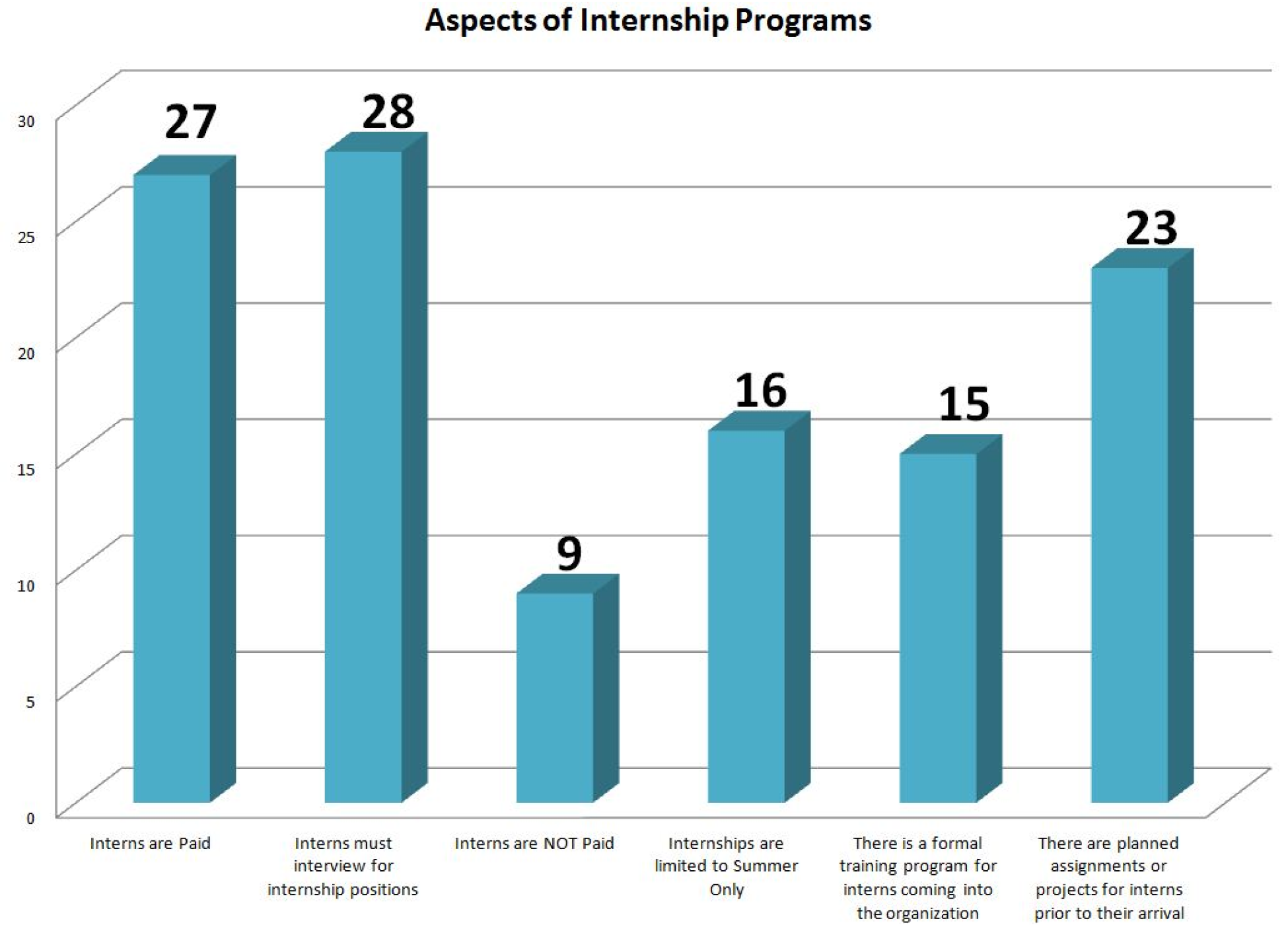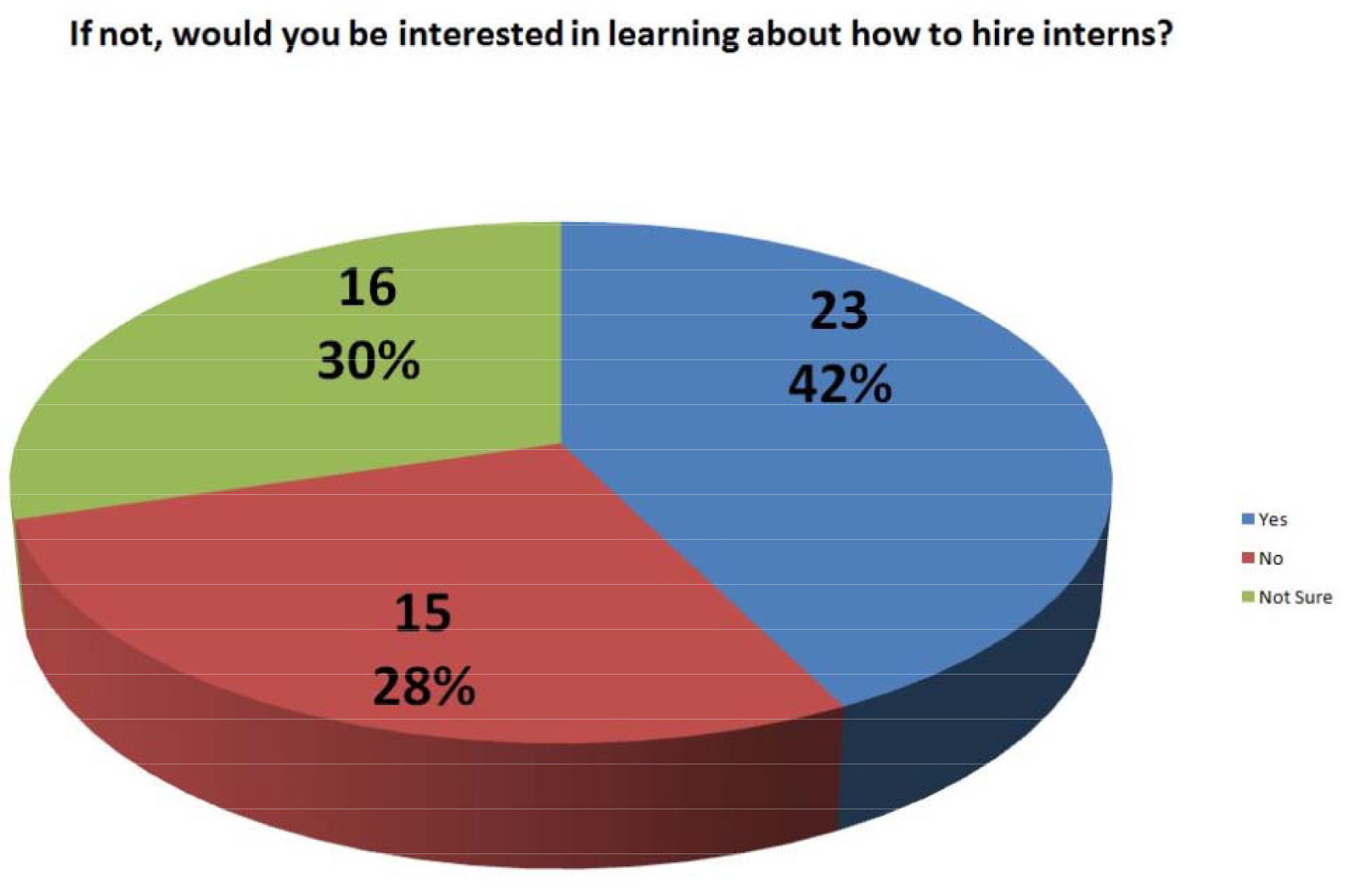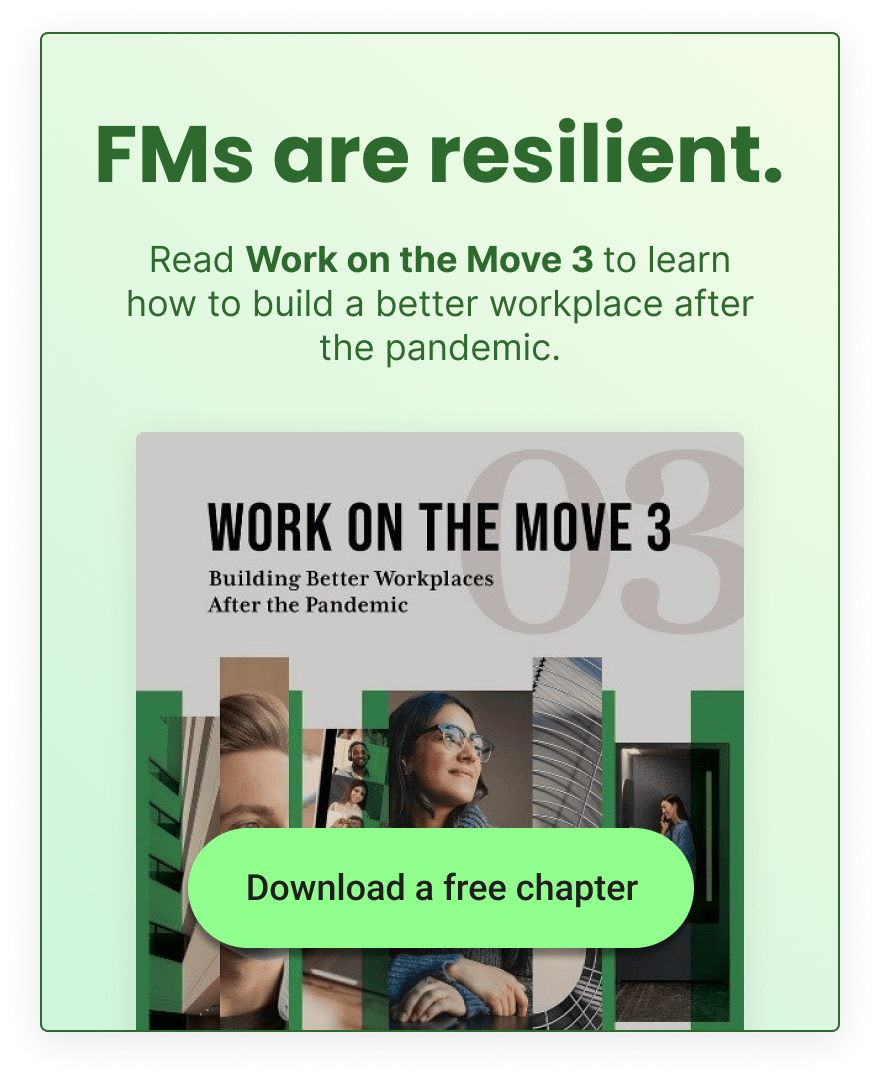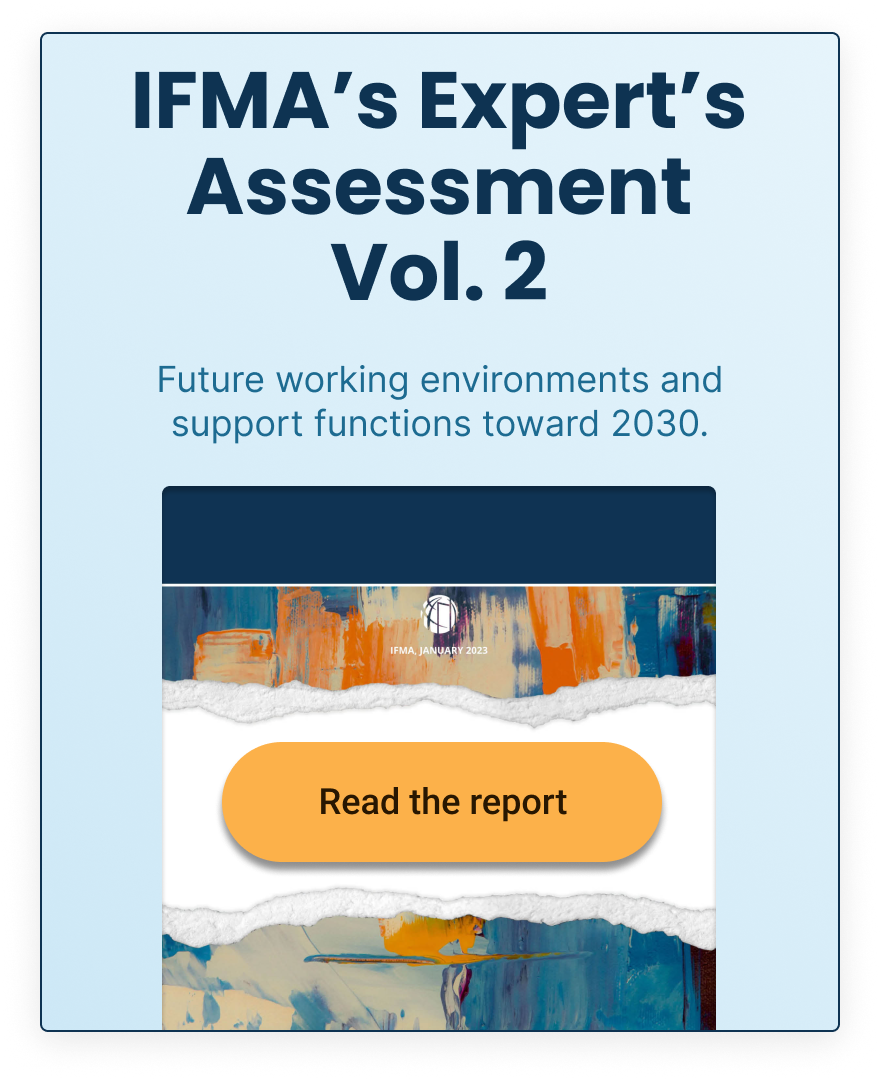Industry Exchange Through Student Internships
Results of a survey providing a basic understanding of practices in hiring and managing FM interns, including suggestions from the respondents on best practices as well as resources from other industries that can be applied to facility management.
Vol.4, No.3 • October 2013
Industry exchange through student internships
Kathy O. Roper, CFM, MCR, LEED AP, IFMA Fellow
Georgia Institute of Technology, Atlanta, Georgia, USA
Kathy.Roper@gatech.edu
and
Joseph Geierman, FMP, CFM
Troutman Sanders, LLP, Atlanta, Georgia USA
Introduction
Facility Management as a field of study at the university level has only been recently offered, still, with a limited number of programs available specific to facility management. Allied degrees in architecture, construction, engineering and business have traditionally been the route that many individuals took before accidentally •falling into• the management of the built environment. On-the-job training was the primary way to learn what to do and what not to do in the field. Obviously, trial and error is not the most efficient learning method.
As a maturing industry, facility management has grown in importance and new formal programs of study are offered around the world. The IFMA Foundation in the mid-1990•s established a •recognition program• for schools teaching facility management in order to help validate those with legitimate, well-informed content. This recognition program moved to accreditation in 2007 in order to more fully acknowledge the importance and impact of facility management formal education. Today, 25 universities around the world have been accredited by the IFMA Foundation (IFMA Foundation, 2013) with more schools continuing to develop programs around facility management and apply for this accreditation.
In addition to formal education in facility management, the on-the-job aspects of learning are still important for experience and learning. An important way to gain this experience prior to the start of a career or full-time position is through internships. Recognizing that there are limited opportunities for facility management students to gain this experience, a professor and former student-now practitioner designed this research to learn more about current practices with internships in facility management and how to potentially improve both the number and quality of internships available to students studying in the field.
As expected, we found that many companies have utilized internships but almost all respondents would appreciate more information and resources to develop or further enhance facility management internship programs. Suggestions from these respondents• best practices as well as resources from other industries that can be applied to facility management are included.
Background
The National Voluntary Health and Social Welfare Organizations convened a national assembly forum in 1994 on successful youth development approaches to preventing alcohol and drug abuse which identi•ed six elements essential for effective youth development programs: a comprehensive strategy with clear mission and goals; committed, caring, professional leadership; youth-centered activities in youth-accessible facilities; culturally competent and diverse programs; youth ownership and involvement; and a positive focus including all youth (Hahn and Raley, 1998). Two of these elements, youth-centered activities in youth-accessible facilities and culturally competent and diverse programs, could also be central to the recognition and
advancement of facility management if youth were given opportunities to understand the diverse and challenging atmosphere offered in facility management as a career. Internships are the college level equivalent of youth programs in providing awareness, knowledge, experience and increasing interest in a field of study or work.
In 1998, Petrillose and Montgomery identified that students who have undertaken an internship as part of their degree in the tourism and hospitality industry were favorably viewed by recruiters. Additional documentation of the benefits of internships has benefits across the three primary stakeholders. Employers, see interns as a means of access to a pool of workers who are typically enthusiastic and dedicated to the industry. They also anticipate that interns may bring fresh ideas to the workplace. Internships also provide employers with an opportunity to screen future, potential employees without making a long-term commitment (Ju, Emenheiser, Clayton & Reynolds, 1998/99; Pauze, Johnson, & Miller,1989; Petrillose & Montgomery, 1998).
For schools offering internships, they can strengthen links with industry which can enhance future collaborative research opportunities, raise the institution•s profile, and establish long-term relationships between industry and the institution, helping to increase employment opportunities for graduates (Bell and Schmidt, 1996; Walo, 1999).
Students view internships as opportunities to practice what they have learned in class, and to gain a clearer understanding of day-to-day job requirements. They are also able to test career choices and develop important hands-on workplace skills (Barron and Maxwell, 1993; Emenheiser, Clayton, and Tas, 1997; Petrillose & Montgomery, 1998). Additional maturity may be gained from internships which help to reveal what the real working world is like for students. These may include cultural and other •soft skills• such as dress in the workplace, etiquette/manners, communication skills and other observations that might escape classroom teachings.
The longer history of the hospitality and tourism education industry sets a background for the success of internships for facility management, with research showing favorable support by industry. Walo found that approximately 75% of organizations implementing internships each year offered continuing employment to the student at the completion of the internship (Walo, 1999). It remains for future research to determine if similar percentages might be adopted in facility management internships.
Methodology
A literature review of scholarly publications was made to better understand what research has already been completed on internships in general. There are limited studies, but some work, primarily in the fields of hospitality and tourism, as well as marketing and business education, that indicate that internships, while valuable to career achievement and industry, have been undervalued and under-evaluated in terms of value and support provided by the universities, as well as the professional community (Hunt, et.al, 1986; English and Lewison, 1986; Gault, et.al, 2000).
To determine current use of internships and opinions about them specifically in the facility management field, a questionnaire survey was sent to several large chapters of the International Facility Management Association (IFMA) with an undetermined distribution. The survey can be viewed in Appendix 1. Additional postings to several social media sites (LinkedIn and Facebook) with facility/ies management themes were made with descriptions of the survey and its intern, along with an internet link to the survey were posted to enhance the international participation in the survey. With these methods and the short (less than three weeks) response time allowed on the surveys, there were valid responses (those who completed the entire survey) from 65 facility management professionals.
Results of the survey provided basic understanding of the current state-of-the-art in practice in hiring and managing interns. The first question established that a majority of organizations have utilized interns for FM
staffing. Thirty-two percent responded positively to the use of interns in FM with almost two-thirds, 68% responding negatively. Almost half, 49% of respondents knew about internship opportunities from higher education institutions which would include associate, undergraduate and graduate programs at these schools. Nine percent were unsure and 42% were not aware of the opportunity to hire FM interns. This high percentage of unaware respondents points to a potential opportunity to increase internship opportunities by making their availability more widely known.
A slight majority of respondents work for organizations that currently have formal organizational programs for internships, although the programs may not be implemented in the Facility Management department. Forty-nine percent have formal programs, with 43% responding that they do not have formal programs and eight percent who were unsure. Of those responding, more than a third, 42% responded that they would be interested in learning about how to hire interns. However, 30% were •Not sure• and 28% were not interested. Perhaps this question was skewed since respondents with formal internship programs mis-answered that they are not interested since they already have a formal program in place, so this question does not provide significant meaning for the response. Sample responses for open ended questions provide some insight; one respondent stating, •We are an extremely small group and work with outsource providers. They are the ones that should be approached to hire interns.• A similar comment reinforces this same thought, •My role as FM is a singular position with no staff encompassing other support functions within our company (i.e., purchasing, travel, HSE, etc.) It would make it difficult to support an internship unless a specific project was added. We have limited opportunities but perhaps expand IFMA reach to property management companies (CBRE, JLL, etc.).•
Another stated, •Currently interns are not in the FM department.• With a slight majority of respondents interested in internships, the authors suggest it could certainly benefit the industry as well as students to enhance the ability of facility professionals to find available information if they become interested and as suggested in this open response, •I believe that the concerns indicated in these comments could be addressed if Facility Managers were given some strong resources by either the school or professional associations.•
Findings
For a 95 percent confidence level, the appropriate size survey would need to be over 300. With 65 valid survey results, this survey can only be determined to be representative instead of statistically valid. A confidence T analysis of the data points was run for the 65 respondents, utilizing a 95 percent confidence level, which resulted in a .495576 (almost one-half) confidence rating. However, with a one percent confidence level the rate is .658588 (more than half). Essentially, this sample size is large enough to only make generalized assumptions about the population of facility management professionals who might utilize intern programs to develop young FM talent and expand their organization•s staffing level for internships. The researchers would have liked a larger sample for more validity, but feel that the results are still representative of many facility professionals who did not take time to participate in the survey.
As is often the case with facility management professionals, difficulty in gaining survey participation is not unusual, nor does it indicate lack of interest. From experience in the field, as well as years of comments from facility professionals, the increasing demands and workload are the primary factor causing limited participation in surveys, whether online, in person or via mail. Therefore, these researchers feel that basic information is preferable to no information and provide this analysis as a first step in development of a more mature on-the-job internship possibility in the FM field.
The findings of the survey were not surprising but do provide additional information on how current practice in facility management organizations/departments handle interns and the formal or informal structures for interns within organizations. Figure 1 shows results from questions to determine what sorts of programs are currently in place. Just over one-quarter, 27 percent of interns are paid. This was a fairly surprising finding, although in today•s tight economy, perhaps not so surprising that facility groups are maximizing efficiency by utilizing unpaid interns.
An important finding is that only 15 percent of survey respondents state that there is a formal training program for interns within their company. A higher percentage, 23% do have planned assignments for interns before they arrive on the job. Both of these fairly small percentages indicate that further tools or assistance could benefit organizations and potentially increase the likelihood of intern opportunities.

Figure 1. Results for Aspects of Internship Programs from survey
This finding is confirmed with the results of question 4. •Would you be interested in learning about how to hire interns?• Figure 2 shows a fairly equal division of the answers, but favors •Yes• with 42percent, 28 percent responded •No• and 30 percent were unsure.

Figure 2. Results of Question 4, •Would you be interested in learning about how to hire interns?•
To supplement and better rationalize responses, several interviews were conducted with students and companies hiring interns. These interviews are more thoroughly covered in the related practice presentation during World Workplace 2013, •Facility Management Internships: Case Studies from Programs that have Worked.• Future employability was a major concern of the students interviewed. Experience at an American company, even as an unpaid intern, was one student interviewee•s situation. Another discovered Facility Management as a profession through an internship opportunity while still in high school. The professional Facility Manager who had directed interns relayed that an important factor for participating in an internship program was having a third party (CoreNet Global) that was able to do much of the organization of the internship process (working out pay issues, finding willing students, etc.). These factors helped to guide development of recommendations for how to develop and expand internship opportunities for facility management students and employers.
Conclusions and Recommendations
Based on limited survey results and supplemental interviews with students and an internship manager, the conclusions provide the expected confirmation that many organizations need assistance in developing and launching an internship program. Most are positive about the possibility to help FM students and at the same time, benefit from low or no-cost assistance.
The authors hope that the facility management industry will address further research and possible funding toward development of tools to assist organizations in developing more opportunities for student internships. This is an important link between industry and academia, and likely to become more critical in the near future as the pool of experienced facility professionals retires and exits full-time employment.
A few recommendations from the survey results and interviews are listed below.
- There is a need for a more formalized internship process within the profession. With a proliferation of FM undergraduate and graduate programs, as well as various certificate programs, the numbers and need are increasing.
- There are opportunities here that local chapters and councils could help take the lead on to promote the profession, add value for their members, and increase their long-term membership by helping students get started in their careers. A number of IFMA members already have successful, formal internship
- programs that could be •cloned• or adapted with a guideline or recommendation sheet to help more FM•s understand the need and develop these mutually beneficial programs.
- Without an internship program like this, IFMA is ceding the space to other organizations that may end up claiming these new professionals, or losing young professionals to related fields and industries.
Acknowledgements
As an unfunded research project, the authors thank the many facility managers who did take time to read and respond to this survey. In hopes of learning about the awareness, needs and expectations of FM practitioners regarding internships, the authors acknowledge this is only a beginning step.
References
Barron, P., Maxwell, G. (1993) •Hospitality management students• image of the hospitality industry,• International Journal of Contemporary Hospitality Management, Vol. 5, No 5, page 8.
Bell, B., Schmidt, C. (1996) •Field practicums: What influence on graduate careers?• in A. Yarrow, J. Millwater, S. DeVries, and D. Creedy (Editors.), Practical experiences in professional education, monograph, Queensland University of Technology Publications and Printery, Brisbane, Australia, pp.123-134.
Emenheiser, D.A., Clayton, H.R., and Tas, R.F. (1997) •Students• perceptions of the effectiveness of the hospitality industry internship experience. Proceedings of the Annual CHRIE Conference,
Association for Tourism and Hospitality Educators, pp. 221-222.
English, Wilke D. and Lewison, Dale M. (1979) •Marketing internship programs: Striking out in the academic ballgame,• Journal of Marketing Education, Vol. 1 (November) pp. 48-52.
Gault, Jack, Redington, John, Schlager, Tammy (2000) •Undergraduate Business Internships and Career Success: Are They Related?• Academy of Management Review Vol. 22, No. 1, pp. 45-53.
Hahn, Andrew B., Raley, Gordon A. (1998) •Youth Development: On the Path Toward Professionalization,• Nonprofit Management and Leadership, Volume 8, Issue 4, pp. 387•402.
Hunt, Shelby D., Chonko, Lawrence B. and Wood, Van R. (1986) •Marketing education and marketing success: Are they related?• Journal of Education, Vol. 2 (summer), pp. 2-12.
IFMA Foundation (2013) •Accredited Degree Program,• available at: http://www.ifmafoundation.org/accredited-degree/ (accessed June 12, 2013).
Ju, J., Emenheiser, D., et.al., (1999) •Korean students• perceptions of the effectiveness of their internship experiences in the hospitality industry in Korea,• Asia-Pacific Journal of Tourism Research, Vol.3, No.1, pp. 37-44.
Pauze, E.F., Johnson, W.A., and Miller, J.L. (1989) •Internship strategy for hospitality management programs,• Hospitality and Education Research Journal, Vol. 13, No.3, pp. 301- 307.
Petrillose, M.J., Montgomery, R. (1998) •An exploratory study of internship practices in hospitality education and industry•s perception of the importance of internships in hospitality curriculum,• Journal of Hospitality and Tourism Education, Vol. 9 issue 4, pp. 46-51.
Sandberg, J., Tsoukas, H. (2011). •Grasping the Logic of Practice: Theorizing through Practical Rationality,• Academy Of Management Review, Vol. 36, No. 2, pp. 338-360.
Suttona, William A. (1989) •The Role of Internships in Sport Management Curricula • A Model for Development,• Journal of Physical Education, Recreation & Dance, Volume 60, Issue 7, pp. 20-24.
Walo, Michael, (1999) •The latest win-win strategy in recruiting hotel staff, Hotel Management, Vol. 12, issue 7, pp. 32-33.
Appendix 1. Academic/Industry Exchange through Interns Survey
Academic / FM Industry Exchange through Interns
- Has your organization utilized interns for Facility Management staffing?
- Has your organization utilized interns for Facility Management staffing? Yes
- No
- Not Sure
2. Are you aware of Facility Management programs in higher education that may offer internship opportunities?
- Are you aware of Facility Management programs in higher education that may offer internship opportunities? Yes
- No
- Not Sure
3. Does your organization have a formalized internship program?
- Does your organization have a formalized internship program? Yes
- No
- Not Sure
- If not, would you be interested in learning about how to hire interns?
- If not, would you be interested in learning about how to hire interns? Yes
- Not Sure
5. If your organization does have an internship program, could you share some details on the program with us:
- If your organization does have an internship program, could you share some details on the program with us: Internships are limited to summer only
- Interns are paid
- Interns are NOT paid
- Interns must interview for internship positions
- There is a formal training program for interns coming into the organization
Other (please specify)
- There are planned assignments or projects for interns prior to their arrival
6. What do you think are benefits of an internship program?
- What do you think are benefits of an internship program? Interns could help handle department workload
- Interns could bring new ideas to the organization
- Other (please specify)
- Interns will enhance their competitiveness in the job marketplace
7. Please describe any noteworthy positive OR negative experiences your organization has had with interns in the FM department
Please describe any noteworthy positive OR negative experiences your organization has had with interns in the FM department
8. What kind of resources or help would you require to bring an FM Intern on at your company?
What kind of resources or help would you require to bring an FM Intern on at your company?
9. May we contact you if we would like to get more detailed information about your responses?
May we contact you if we would like to get more detailed information about your responses? Yes
Want even more Content?

Since you’re already a user, you know that IFMA’s Knowledge Library offers all FM content in one place. But did you also know that by signing up via email to become a registered user, you can unlock even more resources?
Signing up via email for registered access within the Knowledge Library brings more content and functionality to your fingertips. Expect to grow your facility management knowledge, career and network faster than ever before.


